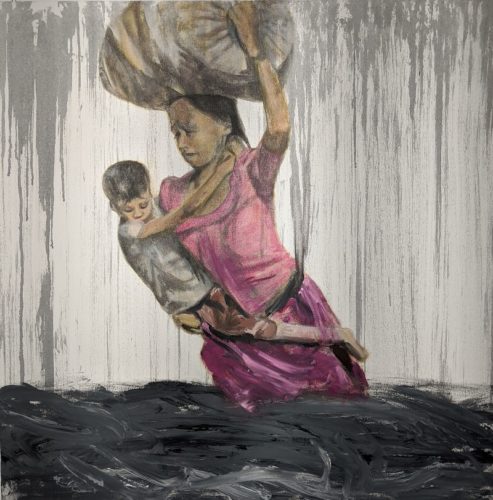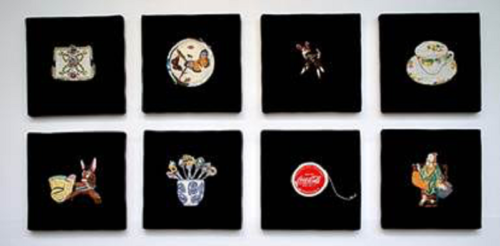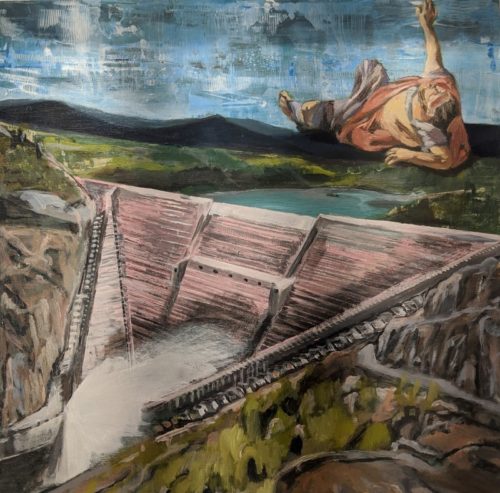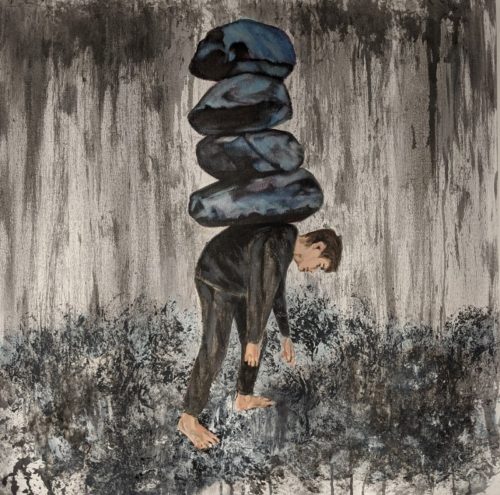
TUCKED away on the first floor of the ACT Legislative Assembly in its exhibition room is a striking exhibition by recent ANU painting and textiles graduates, Toni Hassan and Kerry Martin.
Both graduated with a BA in visual arts from the ANU School of art and design in 2018 and bth received the Legislative Assembly Speakers Award from Joy Burch, MLA, as part of the Emerging Artist Support Scheme. This exhibition is part of that award.

The title of the joint show, “Alone together,” refers to things common to both their art. While Martin’s work has been a way of dealing with her mother’s dementia, exploring through exquisite embroidery the bond of mother and daughter and the loneliness caused by loss of memory, Hassan works in a more social context, considering the residue of colonialism and the lot of refugees.
Martin was not at the Assembly when I visited, but Hassan was, preparing for a floor-talk.

Born in South Africa and moving to Australia when she was six years old she was already a well-known author and journalist before she commenced her art studies, she majored in painting, but now says she is considering a move into sculpture.
“Visual art allows you to be present,” she says, “in sculpture there is kind of physicality, so when I was at art school I did as many sculpture units as I could… physical stuff gave me agency – wood, metal, clay, moulding.”
But this is primarily a painting exhibition, with 16 paintings on show and she concedes that “Painting allows past images to move into the present.”

A case in point is the work which won her the EASS award, “Shifting ground and King Billy,” an eloquent acrylic image (now permanently acquired by the Assembly) of the Wiradjuri man, Jimmy Clements, who walked for nearly a week to attend the opening of Parliament House in 1923. It helps to know the story, but the work is immediately recognisable as a reflection on race and power.
The former recipient of a Human Rights Award and a Walkley Award for her coverage of refugee health issues, Hassan is now an adjunct research fellow at the Australian Centre for Christianity and Culture, and believes the sacred and the secular are connected in her art.
“Between heaven and earth,” which shows an “Everywoman” mother with a child, was derived from photos the artist had seen of flooding in Myanmar but it speaks to all nations. Again, the image is as eloquent as the title.
“Painting can also be a walk into the great unknown,” she says.

In “I am sorry we have burdened you (a mother’s climate change grief),” we see a figure carrying stones, an ancient archetypal image, but one that immediately links into the environmental present.
The concept of exile is explored as a mental or physical state of displacement, deportation and social isolation, but the exhibition also includes portrait other children, “The very opposite of my displaced images,” she says.

In “Island exile” Hassan looked back to her family’s ancestry in the remote island of St Helena, famous as the place of Napoleon Bonaparte’s exile and death. Usually, she explains, the island is painted with a figure in the landscape, possibly Napoleon, but she has chosen a bare landscape suggesting isolation.
In “Yearning for more rain (Cotter’s hope),” Hassan mixes the biblical motif of St Paul’s Damascus Road experience as, before an image of the Cotter Dam, he falls to the ground in a revelation or an epiphany.
“Have we had our epiphany this summer?” she asks rhetorically.
“Alone together: Kerry Martyn and Toni Hassan”, exhibition room, floor one ACT Legislative Assembly exhibition room, Civic Square, entry during weekday Assembly hours until January 31.
Who can be trusted?
In a world of spin and confusion, there’s never been a more important time to support independent journalism in Canberra.
If you trust our work online and want to enforce the power of independent voices, I invite you to make a small contribution.
Every dollar of support is invested back into our journalism to help keep citynews.com.au strong and free.
Thank you,
Ian Meikle, editor




![For graphic designer Tracy Hall, street art is like any artwork, her canvas has been swapped out for fences and plywood, her medium changing from watercolours to spray paint.
A Canberra resident for 13 years, Tracy has been a street and mural artist for the past five.
Her first exploration into grand-scale painting was at the Point Hut toilets in Banks five years ago. “They had just finished doing up the playground area for all the little kids and the words [of graffiti] that were coming up weren’t family friendly,” she says.
“So I ended up drawing this design and I got approval for the artwork.”
Many of Tracy’s time-consuming artworks are free, with thousands of her own dollars put into paint.
@traceofcolourdesigns
To read all about Tracy's fabulous street art, visit our website at citynews.com.au or tap the link in our bio! 🎨🖌
#canberranews #citynews #localstories #canberrastories #Citynews #localnews #canberra #incrediblewomen #journalism #canberracitynews #storiesthatmatter #canberralocals #artist #streetart #streetartist #StreetArtMagic](https://scontent.cdninstagram.com/v/t39.30808-6/490887207_1225841146218103_6160376948971514278_n.jpg?stp=dst-jpg_e35_tt6&_nc_cat=106&ccb=1-7&_nc_sid=18de74&_nc_ohc=1BXnbxXvf_8Q7kNvwGxh1zh&_nc_oc=Adkh3RxuUkrP0SYqfZ05hihf5KR4C5x0esctcQMhxNfh7FjQpPqh6aJiWWGR5JJn29Y&_nc_zt=23&_nc_ht=scontent.cdninstagram.com&edm=ANo9K5cEAAAA&_nc_gid=F56SSof8Rx0va5tImNGCFw&oh=00_AfHsvWhqDuoBTQn4Bvmra0tBDa1dxrfiG1A1rNkYRbv6dA&oe=680CDD94)



Leave a Reply